#trojanerkrieg
Text
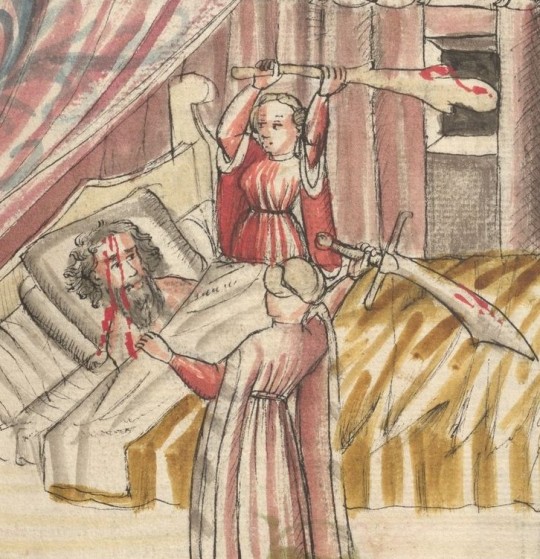
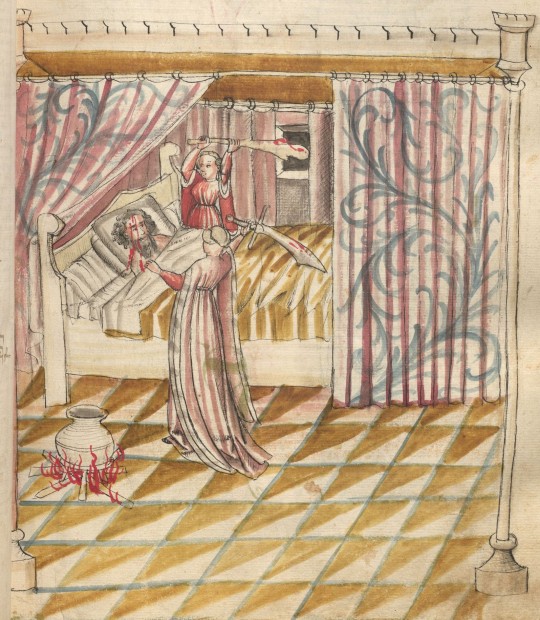
an unpleasant awakening
in a copy of konrad von würzburg's "trojanerkrieg", ca. 1441
source: Nürnberg, GNM, Hs. 998, fol. 15r
#the illustration depicts king peleus being murdered by his daughters at the command of medea#15th century#medieval art#mythology#medieval illumination#medieval#murder#violence#bed#weapons#trojanerkrieg#konrad von würzburg
6K notes
·
View notes
Text
Paris’ Prologue 12: The Judgement of Paris - Part 7 (13th-15th Century AD Sources)
Chapter 12: The Judgement of Paris - Part 7 (13th-15th Century AD Sources)
Artistic Depictions
Manuscript Illustration of the Dit de la Fonteinne Amaoureuse of Guillaume de Machau. ID: Paris Bibliotheque Nationale, MS.fr.22545, fol.129v (c. 14th Century AD): To find the picture you must select 129v on the link. [Image found at http://beta.biblissima.fr/fr/ark:/43093/mdata3cf124d5816d6e35467b3078be1f7239b9ef372b]
Italian Painting. Museum: Museo Nazionale (c. early 15th Century): Two different scenes are being shown. The upper scene is before the decision is made and the bottom scene is decision time. [Image found at https://commons.wikimedia.org/wiki/File:Unknown_painter_-_The_Judgement_of_Paris_-_WGA23922.jpg]
Italian Painting by Master of The Judgment of Paris. ID: Glasgow 35.634 (c. 1450-1455 AD): [Image found at https://commons.wikimedia.org/wiki/File:The_Master_of_the_Judgement_of_Paris_(Burrell_Collection).jpg]
Italian Painting by Sandro Botticelli. Museum: Galleria Cini (1464 AD): [Image found at https://en.wikipedia.org/wiki/File:Botticelli-Juicio-de-Paris.jpg
Manuscript Illustration of Raoul Lefèvre’s Recuil des Histoires de Troie. ID: Paris Bibliotheque Nationale, MS.fr.22552, fol.214v (c. late 15th Century): [Image found at http://gallica.bnf.fr/ark:/12148/btv1b10536284w/f460.image]
Manuscript Illustration of John Ridwall’s Fulgentius Metaforalis. ID: Bibliotheca Apostolica Vaticana, MS.Pal.Lat.1066, fol.299r (c. 15th Century AD): In the bottom scene, Paris judges the bulls while the three goddesses watch. [Image found at http://digi.ub.uni-heidelberg.de/diglit/bav_pal_lat_1066/0465/image]
Manuscript Illustration from Christine de Pisan’s Epitre d’Othea. ID: Bodleian Library MS.Bodley 421 (c. late 15th Century): Paris is found sleeping before Mercury and the goddesses during the Judgement. There’s an entire bird as Paris’ helmet decoration. Also the fountain statue is urinating water. [Image found at http://bodley30.bodley.ox.ac.uk:8180/luna/servlet/detail/ODLodl~1~1~34730~126841:%C3%89p%C3%AEtre-d-Oth%C3%A9a-?qvq=w4s:/what/MS.%20Bodl.%20421;lc:ODLodl~29~29,ODLodl~7~7,ODLodl~6~6,ODLodl~14~14,ODLodl~8~8,ODLodl~23~23,ODLodl~1~1,ODLodl~24~24&mi=84&trs=123]
Literary Sources
Trojumanna Saga paraphrase (c. Mid 13th Century AD): Priam originally wanted to expose the baby Paris but Hecuba secretly sent him to a fóstr. The “wedding couple was Paris and Thetis. It was Thetis herself that threw the apple of discord. The three goddesses in the Judgment were Freyja, Sif, and Gefjon. The Judgment was merely a dream in Paris’ head. {Paraphrase from Excidium Troiae, Introduction [chapter], edited by E. Bagby Atwood and Virgil K. Whitaker, published by Medieval Academy Books 1944. Retrieved from http://www.medievalacademy.org/resource/resmgr/maa_books_online/atwood_0044.htm}
Guido de Colonna Historia Destructionis Troia paraphrase (c. 1287 AD): Paris’ adventure occurred while he was in “India Minor” [corrupted form of mount Ida] at his father’s command. It was the summer solstice [traditional date of witch visits], with the sun in the beginning of Cancer. At dawn on a Friday (“die Veneris”), he went to the woods with a group of hunters to hunt. By noon he had found no game, but then he saw a solitary stag. Leaving his companions behind, he pursued it into the woods called Ida, only to have it disappear. He and his horse were tired, and his horse was soaked with sweat, so he dismounted and tied the horse to a tree, then stretched himself out on the grass in the shade, pillowing his head on his bow and quiver. Almost immediately, he fell asleep, and in his sleep he saw a wonderful vision.
It seemed that Mercury came to him leading Venus, Pallas, and Juno and explained that they had agreed to let him settle a dispute. As they ate a feast, a certain apple of precious material was cast among them. A Greek inscription indicated that it was to be given to the most beautiful goddess. Mercury told Paris that each of the three believed she deserved the apple and then relayed the promise each offered him in exchange for the prize. Juno would make him the most magnificent of all magnificent men in the world; from Pallas, he should obtain all human knowledge; Venus would give him the most beautiful and noble woman of Greece. Paris answered that he could not give true judgment unless all the goddesses presented themselves to him nude. Mercury ordered it done, and Paris decided that Venus deserved the apple. Paris regards this dream as an omen that mean the gods will favor his voyage to Greece. Guido implies that Paris is placing his trust in a demonic inspired delusion, and thus the stage is set for the fall of Troy. {Paraphrase from The Judgement of The Trojan Prince Paris in Medieval Literature by Margaret J. Ehrhart, published by University of Pennsylvania Press 1987, pp. 45-46, 49.}
Der Gottweiger Trojanerkrieg paraphrase (c. 1300 AD): Paris was a knight-errant who wandered about overcoming giants and dwarfs and otherwise distinguishing himself by mighty deeds of arms. While still a shepherd, he slays a dog with his fist, and later overcomes a she-bear and a lion. Juno’s bribe was that she offered all the treasures buried since Adam. After his judgment of the goddesses Paris sets out in search of adventure; but rather than merely go to Troy and distinguish himself in the stadium, he wanders about and engages in a series of gaudy mediaeval battles. He is finally dubbed ‘knight’ by the ‘kaisser’ in Constantinople and is there victorious in a glorious tournament. {Paraphrase from Excidium Troiae, Introduction [chapter], edited by E. Bagby Atwood and Virgil K. Whitaker, published by Medieval Academy Books 1944. Retrieved from http://www.medievalacademy.org/resource/resmgr/maa_books_online/atwood_0044.htm}
Robert Mannying Story of England paraphrase (c. 1338 AD): In Troy lived Priam’s son, Duke Paris, who pastured beasts in the field, this being in ancient times a privilege accorded only to knights. One day there came a Greek bull who fought a bull of Paris’, returning day after day for a renewed battle. Paris determined to crown the winner, and did so even though it was the Greek bull which conquered. Three witches, who “ladies were called, and in the eyrie did fare”, happened to observe the bullfight and were impressed with Paris’ justice. The witches were Juno, giver of might, Pallas, giver of wisdom and right, and Venus, giver of love. They began to argue about their beauty and decided to make Paris their judge, determining to make a ball of some kind for him to award the fairest among them. Before the day of judgment, Juno came to Paris secretly, explained their plan, and promised that if he gave her the ball, he should have no equal in Troy and worldly position. Pallas came secretly also and promised to make Paris wisest of all if he gave her the prize. Venus came last, offering the fairest lady alive in exchange for the ball. Paris reflected that, being a king’s son and the wisest in Troy, he had no need of Juno’s or Pallas’ gifts. He was eager to love, however, and so promised the ball to Venus. The witches arrived for the judgment on the appointed day; Venus won the prize, whereupon the other ladies are “wrath all-mad”. {Paraphrase from The Judgement of The Trojan Prince Paris in Medieval Literature, University of Pennsylvania Press 1987, p. 66. Paraphrase also from From Excidium Troiae, Introduction [chapter], edited by E. Bagby Atwood and Virgil K. Whitaker, published by Medieval Academy Books 1944. Retrieved from http://www.medievalacademy.org/resource/resmgr/maa_books_online/atwood_0044.htm}
Seege or Batayle of Troy: Lincoln’s Inn Manuscript paraphrase (c. Early or Mid 14th Century AD): Priam has three sons: Ector, Troyle, and Alisaunder Paris. Hecuba, when pregnant, dreams that she gives birth to a firebrand which burns the city of Troy and all the surrounding country. She “sent after masters, old and young, and bade them say what should befall, and bade them say nothing of lies, what her dream should signify.” The queen was woe, and said to them ‘it shall not be so’. The dream is interpreted to mean that her son will bring about the destruction of Troy. When the son is born, he was considered “fairer might no man see with eyes, the child seemed fair and soft.” When he is seven years old she sends him into the fields. She does this so that “he should see no armor bright, nay no battle, nay no fight.” He is brought up as a swineherd, where he takes pleasure in making the animals fight, and crowns the winner with a garland. On account of his wisdom he is called Paris. Later Priam hears of the wisdom of his son and sends for him. In an assembly in which Priam is considering the sending of an expedition into Greece, Paris rises in Priam’s parliament to describe the adventure which has convinced him that he should lead the Trojan Fleet to Greece. Paris relates that he was hunting one day in the forest when the weather changed, and in a great mist he became separated from his hunting party. He rode so far that he took a wrong turn and lost his way, finally dismounting and falling asleep under a tree.
Meanwhile “four ladies from Elfenland”, playing in the forest, found a golden ball with silver letters which read “the fairest woman of all shall have and wield this rich ball.” As three of them, Saturnus, Jubiter, and Mercurius, argued about who should have the ball, the fourth, Venus, suggested that they ask the sleeping knight, Paris. They agreed and bade him wake up and bestow the ball on the lady who most deserved it. As Paris hesitated, Saturnus offered to make him the richest man in the world if he awarded her the ball. Paris, however, reflected that he had no need of more riches. Mercurius offered to make him the strongest man in the world, but Paris considered that he was strong enough. Jubiter offered to make him the fairest man in the world, but Paris decided that he needed no more beauty. Finally Venus spoke, offering him the love of all women. Paris was swayed by her promise and awarded her the ball. Then Venus instructed him to tell his father the king to send him to Greece, where he would win the fairest lady. {Paraphrase from The Judgement of The Trojan Prince Paris in Medieval Literature by Margaret J. Ehrhart, published by University of Pennsylvania Press 1987, p. 54. Paraphrase also from Excidium Troiae, Introduction [chapter], edited by E. Bagby Atwood and Virgil K. Whitaker, published by Medieval Academy Books 1944. Retrieved from http://www.medievalacademy.org/resource/resmgr/maa_books_online/atwood_0044.htm. Quotes were directly from Lincoln’s Inn Manuscript of The Seege or Batayle of Troy: A Middle English Metrical Romance, edited by Mary Elizabeth Barnicle, published by Early English Text Society 1971.}
Second Redaction of Histoire Ancienne paraphrase (c. Mid 14th Century AD): Paris was fair, pleasant to ladies, good in archery and hunting, but not so knightly as his brothers. On the night he was conceived, Hecuba dreamed that she gave birth to a torch which set fire to Troy. Diviners told Priam the dream meant that his wife had conceived a child through whom the city would be destroyed. The king ordered the queen to kill the child, but Hecuba had pity on the infant and secretly sent him to a vavasor who adopted him and named him Alexander. When he was grown, he married Cenona. Once when he had gone to see his animals, an unfamiliar bull fought one of his own and, after a long battle, conquered it. Paris crowned the strange bull with flowers in sign of its victory. The story of his action spread through the country, and Paris was praised for his justice.
One day Juno, Pallas, and Venus gathered to enjoy themselves; when the goddess of discord saw that she had not been invited to the fête, she was angry. Determined to disrupt their pleasure, she made a golden apple inscribed, “Let this apple be given to the most beautiful.” When the ladies had feasted, they entered a vergier and sat around a fountain to converse. Then the goddess of discord came flying through the air and let the apple fall among them. When the ladies saw the apple, each said she ought to have it, and the discord was great. Finally all agreed to seek a judge. They went through the forest until by chance they came upon a fountain under an olive tree where Paris slept. They said to one another, here is Paris, son of King Priam; his honesty is shown by his crowning the strange bull. They awoke him and asked him to award the apple to the most beautiful. Juno promised that if he chose her she would help him whenever he had need and would bring to his assistance all the powers of heaven. Pallas told him that as goddess of sapience she would give him wisdom and knowledge and would aid him whenever necessary. Venus promised him that all women would love him and that he would have the most beautiful woman in the world for his amie. At last he gave the apple to Venus, and the other goddesses were very angry. {Paraphrase from The Judgement of The Trojan Prince Paris in Medieval Literature, by Margaret J. Ehrhart, published by University of Pennsylvania Press 1987, p. 63.}
William Caxton’s Translation/Alteration of The Recuyell of the Historyes of Troye by Raoul Lefèvre (c. 1471 AD): “[Paris speaks to Priam]: It happened to me lately … that by your commandment I was in the Lesser Indies [Asia Minor] at the beginning of the summer, and that upon a Friday I went me to hunt in a forest right early, and that morning I found nothing that gave me any pleasure. And then after midday I found a great hart that I began to chase so swiftly that I left all my fellowship behind and followed the hart into the most deserted place in all the forest, which forest was called Ida. I followed him so long that I came to a place that was passing obscure and dark. And then I saw no more the hart that I chased. I felt me sore weary and my horse also could go no farther and was all in a sweat. I alighted and tied my horse to a tree and laid me down upon the grass, and laid my bow under my head crosswise instead of a pillow, and soon I fell asleep. Then came to me in a vision the god Mercury, and in his company three goddesses, that is to wit Venus, Pallas, and Juno. He left the goddesses at a little distance and appeared and said to me in this wise:
“Paris, I have brought these three goddesses unto thee, for a great strife and tension has fallen between them … As they ate the other day in a palace, suddenly there was cast an apple of so marvellous form and fairness and beauty that no such had been seen among them. And there was written about this aforesaid apple in Greek language that it be given to the fairest. And so each of them would have it beyond everything in the world, each saying that she was the most fair and fairer than the others. … And each of them promiseth thee certainly a gift for thy reward that thou shalt have without fail for the award of the apple. If thou judge that Juno be the fairest thou shalt be made the most noble man of the world in magnificence; if thou judge for Pallas she shall make thee the wisest man in the world in all sciences; if thou judge that Venus be the fairest, she shall give unto thee the most noble lady of Greece.” When I heard Mercury speak thus to me I said to him that I could not give true judgment unless I saw them naked before me for to see better the fashion of their bodies. And then Mercury had them unclothe all naked, and then I beheld them long. And methought all three passing fair, but yet me seemed that Venus exceeded the beauty of the others, and therefore I judged that the apple appertained to her.” {Retrieved from The Legends of Troy in Art and Literature by Margaret R. Scherer, published by Phaidon Press 1964, p. 16.}
0 notes
Text
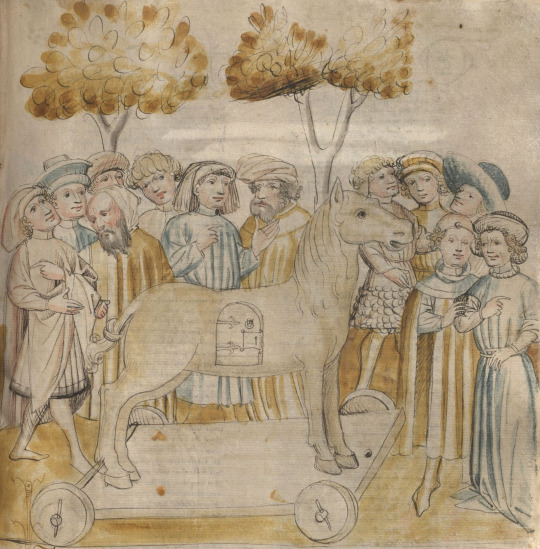
the trojan horse
in an illustrated copy of the "trojanerkrieg" by konrad von würzburg, germany, c. 1441
source: Nürnberg, GNM, Hs. 998, fol. 195r
#dunno man i think something about the sizing of your horse is off#15th century#medieval art#trojanerkrieg#konrad von würzburg#trojan horse#greek mythology#medieval manuscript
202 notes
·
View notes
Text


jason and medea
in konrad von würzburg's "trojanerkrieg" ("the trojan war"), alsace, ca. 1445
source: Berlin, Staatsbibliothek, mgf 1, fol. 86v
#medieval art#illuminated manuscript#trojanerkrieg#greek mythology#15th century#jason#medea#medieval illumination
225 notes
·
View notes
Text
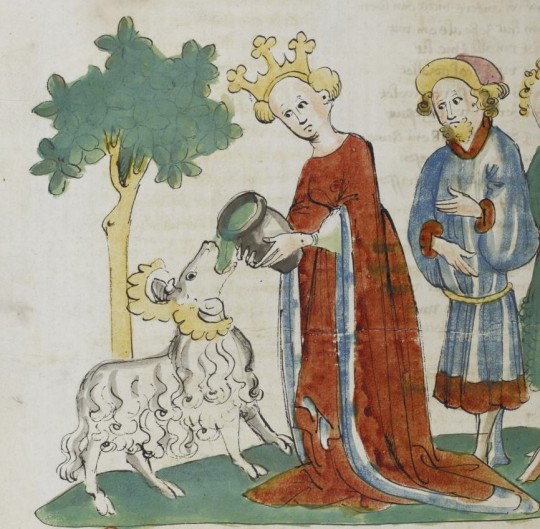
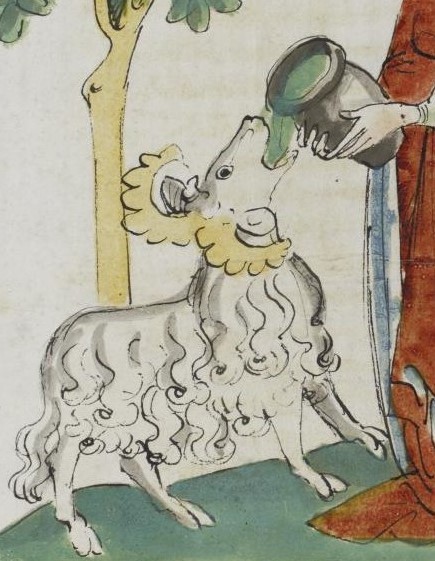
medea administering a rejuvenating potion to an old ram
in konrad von würzburg's "trojanerkrieg" ("the trojan war"), german illustrated manuscript, ca. 1445
source: Berlin, Staatsbibliothek, mgf 1, fol. 104 verso (detail).
#i just think its so funny how the ram is slugging that shit down#has the illuminator ever even seen a ram drink in his life#medieval art#illumination#manuscript#medea#ram#drinking#konrad von würzburg#trojanerkrieg#illuminated manuscripts
358 notes
·
View notes
Text

taking a ride
in an illustrated copy of konrad von würzburgs "trojanerkrieg" (the trojan war), ca. 1441
the illustration depicts thetis and her servant riding dolphins, behind them achilles unconscious in a bag
source: Nürnberg, GNM, Hs. 998, fol. 31v
#ok quick meta commentary i always struggle with the question of how much context i should provide to the images since i feel like too much#information sort of takes away from their aesthetic/mysterious/fantastical/astonishing qualities you know#on the other hand i feel like many of you would be interested in the context#so i guess i'll have to compromise#medieval art#15th century#trojanerkrieg#thetis#achilles#konrad von würzburg#illuminated manuscript#medieval manuscripts
169 notes
·
View notes
Text


paris killing achilles
in an illuminated copy of konrad von würzburg's "trojanerkrieg" ("the trojan war"), alsace, ca. 1445
source: Berlin, Staatsbibliothek, mgf 1, fol.402r
#medieval art#15th century#medieval illustration#trojanerkrieg#konrad von würzburg#paris#achilles#the trojan war
110 notes
·
View notes
Text


achilles in a sleeping bag
in konrad von würzburg's "trojanerkrieg" ("the trojan war"), german illustrated manuscript, ca. 1445
source: Berlin, Staatsbibliothek, mgf 1, fol. 133 verso.
#achilles#konrad von würzburg#medieval illustrations#trojanerkrieg#medieval manuscript#medieval art#illumination#person in bag
55 notes
·
View notes
Text
achilles on skyros (medieval illustrations of a trans lesbian love story)

fig. 1) achilles being put in women's clothing to live as a girl "in disguise" at the court of lycomedes, king of skyros
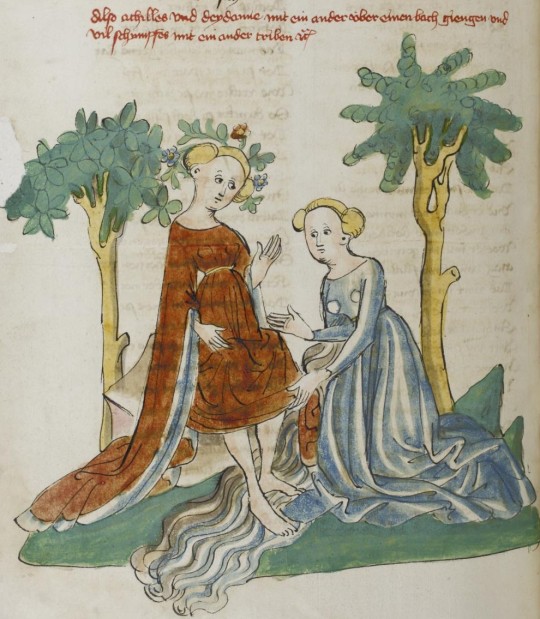
fig. 2) achilles and deidamia, a daughter of lycomedes, fall in love with each other. here they're playing by a stream 💕

fig. 3) achilles being depressed because of their forbidden (queer) love
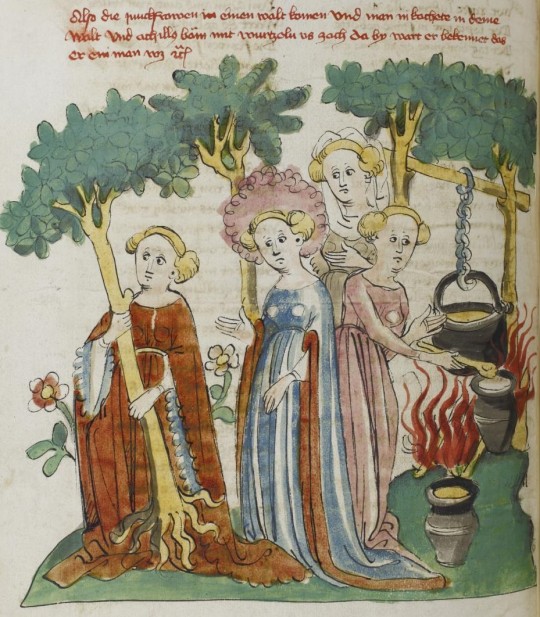
fig. 4) achilles uprooting a tree, thus accidentally revealing his Manhood™ in front of deidamia and other women

fig. 5) achilles and deidamia embracing each other, still in love 💕

fig. 6) achilles and deidamia in bed 👀 - the end.
the illustrations stem from an illuminated manuscript (alsace, c. 1445) containing konrad von würzburg's "trojanerkrieg", a medieval german retelling of the story of the trojan war.
source: Berlin, Staatsbibliothek, mgf 1, fol. 140v-161v
#transfemme achilles everybody!!!#15th century#medieval art#medieval queerness#konrad von würzburg#mythology#illuminated manuscript#medieval illustrations#deidamia#achilles#skyros#gender
366 notes
·
View notes
Text
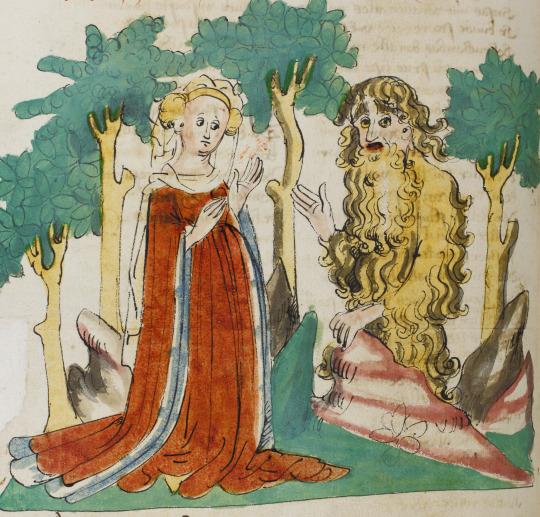
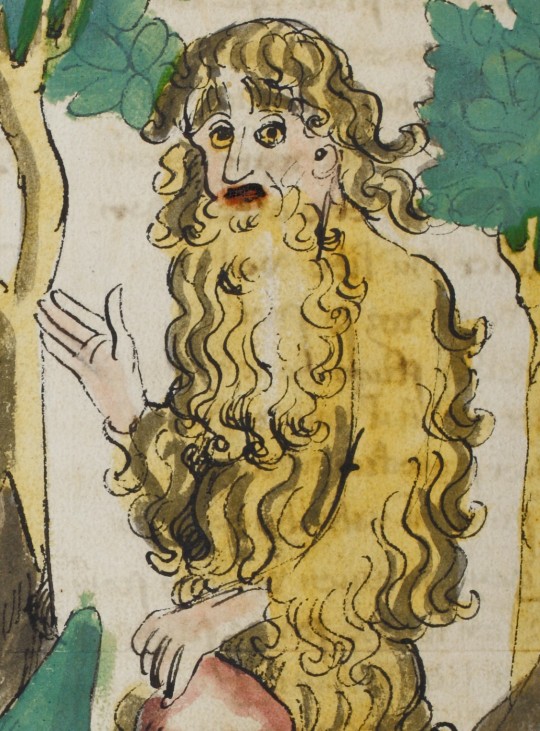
thetis meeting chiron
in konrad von würzburg's "trojanerkrieg" ("the trojan war"), german illustrated manuscript, ca. 1445
source: Berlin, Staatsbibliothek, mgf 1, fol. 56v.
#wild man#chiron#thetis#greek mythology#konrad von würzburg#15th century#medieval art#medieval manuscript#medieval illustration#centaur
130 notes
·
View notes